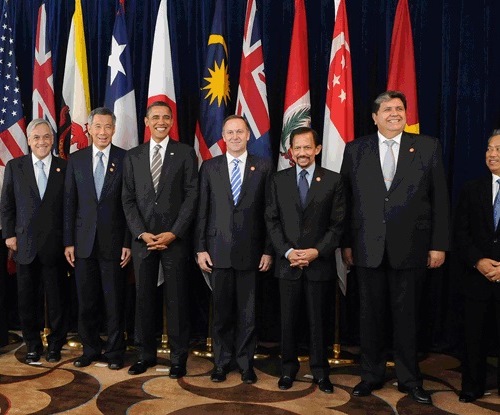
MUAR: The Government will not trade off Malaysia’s dignity and lead it to bankruptcy in regard to the Trans-Pacific Partnership Agreement (TPPA) negotiations held in Kota Kinabalu last week.
Deputy Minister of International Trade and Industry Datuk Hamim Samuri said the government would not ink any agreement without considering the views of all concerned parties and safeguarding the people’s rights.
“This is evident from the nation’s earnings of around RM200bil annually from international trade,” he said at a zakat presentation to 120 orphans and breaking of fast under the SME Bank social corporate responsibility programme at the Pekan Bukit Gambir Mosque here Friday night.
He further assured that the people had no cause to be anxious about the TPPA negotiations as they had not been finalised.
“As a developing country that depends on international trade, Malaysia cannot isolate itself but must participate in such negotiations,” he said.
Meanwhile, Hamim described the objections of non-governmental organisations in Kota Kinabalu and Kuala Lumpur to the negotiations as politically motivated. – Bernama. [Source: The Star Online]
Comment:
For the past few weeks, in anticipation to the upcoming rounds of talks in Kuala Lumpur on the Trans Pacific Partnership Agreement (TPPA), there had been dissenting voices in Malaysia on this opaque agreement fathered by the US and to be agreed upon by 10 other pacific countries, possibly by the end of this year. Much of the negotiations and documentations related to this agreement are kept in secrecy, although some has been leaked. Incomplete information on TPPA has in turn resulted in various speculations and arguments for and against Malaysia signing the agreement. The upcoming visit of Barack Obama to Malaysia en route to Brunei is also said to catalyse the Malaysian government’s desire to sign the agreement, tentatively in October 2013. It is quite clear that TPPA is not just about trade. Its leaked chapters show that TPPA also involve sectors such as the various public services, government procurement, intellectual property etc. Agreeing to a free trade agreement such as TPPA means that local laws and policies must undergo drastic changes which will surely affect the domestic economy and the society as a whole.
Clearly, the ensuing discussion on TPPA is a manifestation of the public anxiety over the inherent evils of capitalism. Capitalism has a battery of armaments in ensuring its survival. One of its most effective survival weaponry is the promotion of free trade. Fundamentally, free trade has a positive connotation but lean it towards capitalism, it becomes the most effective and efficient method of ensuring domination and hegemony of major capitalist economies over economically weaker countries. Often, free trade is conveyed as a platform where all participating countries would be able to trade freely, liberalising a huge market where business deals can be made in a fair, highly profitable manner. TPPA is said to provide such a platform for the 11 participating countries. But is this really true? Is it true that by signing a free trade agreement, a country would be able to reap the promised benefits? In reality what is promised is nothing more than a façade. Free trade agreements such as TPPA are not an equal partnership that stands for mutual gain. It is a one-sided binding agreement which protects the interest of investing foreign companies, especially from US, enabling them to undermine weaker countries and consolidating their hegemony over these countries.
Free trade agreements in the world convey myths and unseen traps which economically weak countries fall into much too often. These agreements are frequently presented as catalysts of development and economic stability. However, what has been happening to the world economy within the past two decades have certainly proven this wrong. In the name of globalization, we see frequent economic crisis, we see countries being stripped bare, unable to protect themselves from waves of foreign financial attacks, and we see wealth being stolen from right in front of our eyes by unscrupulous international conglomerates and speculators.
This is capitalism. This is a system that breeds on pillars built on freedom; freedom to own anything one likes, freedom to say anything one wishes, freedom to believe in anything one feels comfortable with and freedom to express oneself the way he or she likes. This is a system that never guarantees the basic livelihood of an individual and a system that have clearly manifested its unfairness in undeniable ways since its inception until today. Yet, man still clings to this system, despite knowing very well that this is the very system that brings so much misery and despair to him. For Malaysia, signing the agreement would mean opening up the country to unscrupulous capitalists bent on usurping the wealth of the country. But in reality, Malaysia and other Muslim countries have already signed this ‘agreement’, knowingly or unknowingly, by agreeing to implement capitalism and to live by it. Consequently, when a certain part of capitalism is seen to be unfair, a solution within the system is searched for, only to find more unfairness and more grief and this is what one would expect in a system created by man. Allah سبحانه وتعالى has endowed upon man a perfect system, a system that solves all problems of mankind. Man, Muslims in particular, should take heed and learn from the disastrous and detrimental manifestations of capitalism and look into history to see that the perfect system of Islam had been implemented before and only by re-implementing this system under the umbrella of the Khilafah that growth, stability and equality can really be achieved and sustained.
Dr. Muhammad
Malaysia
